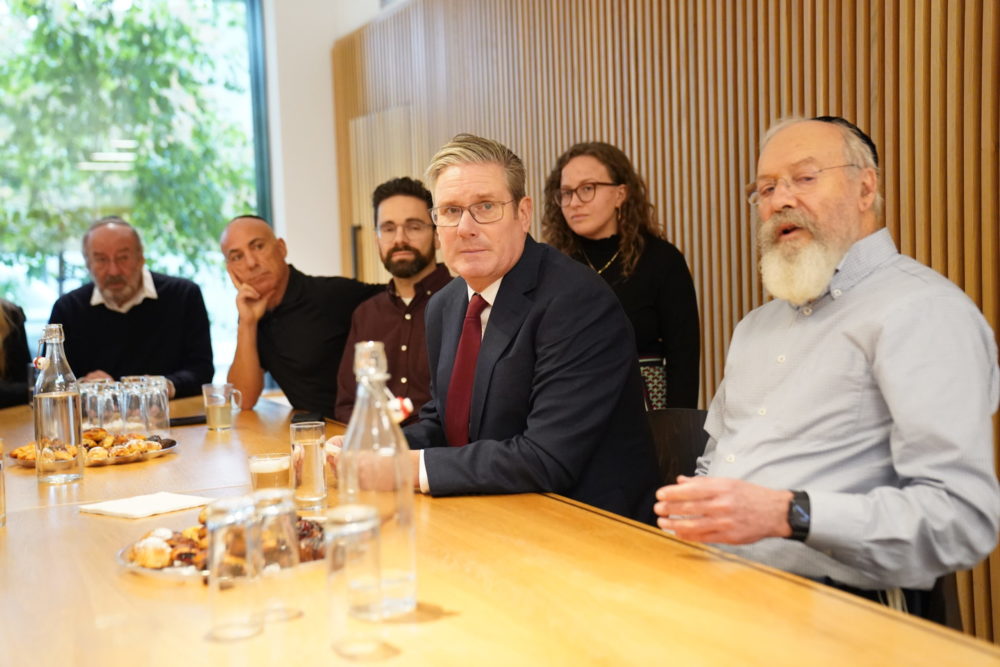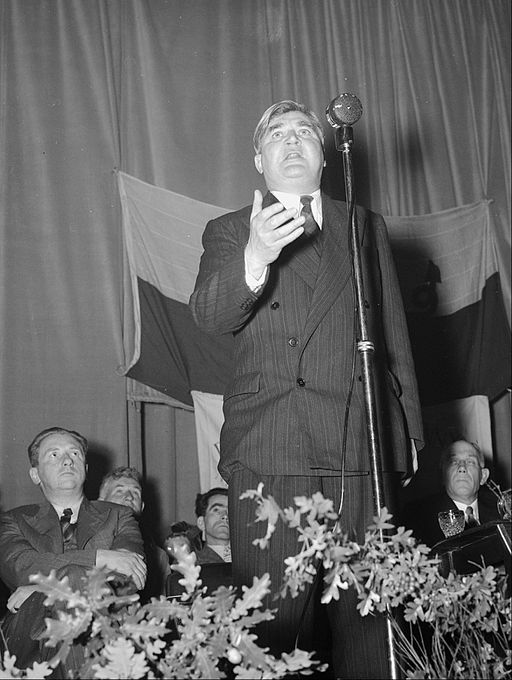Israel, Palestine and the Labour party history that has made Keir Starmer’s position so difficult

James Vaughan, Lecturer in International History, Aberystwyth University
I said: “I found the British still very emotional about Palestine. Why?” And he said: “It’s associated, don’t you think with partisanship with one side or the other. I can’t think of any colony or mandate that was as demanding intellectually and emotionally as Palestine.
These were the words of Harold Beeley, Middle East adviser to Labour foreign secretary Ernest Bevin, as described in an interview with author Hadara Lazar.
There is a general assumption in British politics that the job of a leader of the Labour party in managing internal divisions over the Israel-Palestine conflict presents a more difficult set of challenges than those confronted by the Conservative leader.
It should not be assumed that the Conservatives are entirely immune to divisions on this issue. But insofar as there is something to this proposition, it can largely be explained by the Labour party’s much longer and deeper traditions of competing pro-Zionist and pro-Arab factions.
In August 1917, three months before the Balfour Declaration formally expressed British support for a Jewish national home in Palestine, the Labour party had issued its own statement of support for a Jewish return to a Palestine liberated from Ottoman imperialism.
Party figures like Arthur Henderson, J.R. Clynes, Ramsay MacDonald and George Lansbury, as well as trade union bosses, all made public declarations of support for the idea of a Jewish national home in Palestine.
Anti-Zionist voices
But if the loudest anti-Zionist voices in British politics in the 1920s tended to come from the right of the Conservative party and newspapers like the Daily Express and Daily Mail, there was also opposition on the left. Labour figures like James Maxton regurgitated Soviet denunciations of Zionism as the enemy of the “Arab national revolutionary movement”.
Beatrice Webb, one of the founders of the Fabian Society, characterised the conflict as one between Arab “natives” and Jewish exploiters possessed of “superior wealth”. She also lapsed into cruder antisemitic fantasies about reversing the process by which the Holy Land had been handed over “to the representatives of those who crucified Jesus of Nazareth and … deny that he is the Son of God!”
Nevertheless, by the 1940s, influential figures in the Labour movement, including Nye Bevan, Hugh Dalton, Richard Crossman and Michael Foot, had brought a discernibly pro-Zionist influence to bear. Labour’s Palestine policy, Crossman declared, “was the result of a profound conviction that the establishment of the national home is an important part of the Socialist creed”.
Foot went so far as to inform the House of Commons in July 1946: “If I were a Jew and lived in Palestine, I should certainly be a member of the [Jewish paramilitary organisation] Haganah.”
This did not, however, translate into support for the establishment of Israel in 1948 – thanks largely to Bevin. His abandonment of Labour’s pro-Zionist conference resolutions so angered party chairman Harold Laski that he denounced Bevin as “an outrageous blot on the whole Labour movement”.

It is, therefore, a simplification to speak of a pro-Zionist consensus in the Labour party in the decades either side of Israel’s establishment in 1948. The party did nevertheless remain a welcoming home for Zionist socialists.
A crucial shift occurred after the 1967 six-day war. This was when Christopher Mayhew (Bevin’s former protégé at the Foreign Office in the 1940s) established the Labour Middle East Council to lobby for Arab causes within the party.
A decade after that, a new generation of leftwing activists came to the fore. Ken Livingstone, George Galloway, Jeremy Corbyn and others launched a successful challenge to the party’s right wing and its traditional control of the party’s anti-Zionist networks. Mayhew, a staunch anti-communist, found himself out of sync with the zeitgeist and abandoned Labour for the Liberal Party.
Internal rivalries
There has thus been a powerful tendency for the antagonisms of the Arab-Israeli conflict to map onto Labour’s own internal rivalries and the factional battle for control over the party. Between 1945 and 1967, this usually manifested itself as a clash between a pro-Zionist left and an anti-Zionist right. By the 1980s, the battle lines had been redrawn.
At this point, the Conservative party woke up to the fact that Labour’s wrangling presented it with some interesting political and electoral advantages. Labour’s traditional stronghold of support among the British Jewish community eroded, partly as a result of longer-term socio-economic factors, but also because of the visibility of the anti-Zionist left.
Margaret Thatcher, sharply attuned to Jewish sensitivities within her Finchley constituency, and an early patron of the Conservative Friends of Israel group, was too astute an electoral tactician to pass up the opportunity. It was no coincidence that Labour modernisers like Neil Kinnock and Tony Blair, in their bid to revive the party’s electoral credibility, took very deliberate steps to distance themselves from the anti-Zionist far left.
Starmer’s predicament
The extreme factional antagonisms of the 2015-2019 period of Corbyn’s leadership clearly, therefore, had deep political and emotional roots in the history of Labour’s engagement with the Middle East.
Keir Starmer’s political positioning on the 2023 Gaza conflict is shaped by his experience of the more recent chapters of that history. He has sought to rebuild trust with the British Jewish community and distance the party from what many see as the toxic image it acquired under Corbyn.
Starmer is now all too aware that Conservative strategists seeking to tar him with the brush of Corbynism will use any faltering in his position to argue that nothing has changed and that British Jews should not switch back to Labour.
On the other hand, he will also be aware of the risk that senior Labour party figures, sensitive to the costs of alienating Muslim voters, might break ranks – as several of them already have. This is on top of the wider dangers that stem from a political polarisation manifesting along ethnic lines, and which is already facilitating disturbing upsurges in antisemitic and Islamophobic activity.
These are all pressures and dangers that can be expected to grow as the Gaza conflict intensifies and its human costs mount. The question for Labour is whether Starmer will emerge from it looking like a prime minister in waiting or merely the beleaguered patriarch of a house divided against itself.
James Vaughan is affiliated with the Jewish Labour Movement
This article was first published in The Conversation
![]()
Support our Nation today
For the price of a cup of coffee a month you can help us create an independent, not-for-profit, national news service for the people of Wales, by the people of Wales.







“I found the British still very emotional about Palestine. Why?”
Five thousand dead children.
I agree. But that statement was not the author of the article. It goes back to an Ernest Bevin interview.
That’s only during the current conflict. The murder of Palestinian children by the apartheid state of Israel has a decades long history. See, for example, the ‘Defence of Children International – Palestine’
https://www.dci-palestine.org/
Alun Davies in the Senedd would do well to read this. Although he’ll probably choose not to.
Not a word of the interference in the Labour Party by the Israeli Embassy agent and money, revealed by Al-Jazeera’s undercover journalist. In manufacturing “anti-semitic” complaints, feeding them to anti-Corbyn media and contributing to Corby’s downfall.Nor a word on Starmer’s “I stand with Israel” but never a gesture to Palestine. He’s doing no balancing act between Muslim and Jewish members but behaving as the declared zionist, loyal to Israel, who’s increasingly exposed as unfit to lead Britain.
I hope you didn’t intend to say that Keir Starmer was trying to build trust in the Jewish community (if you can seriously say trust and Keir Starmer in the same sentence), by refusing to call for a ceasefire. This would appear to link the Jewish community, with the bombing of Gaza, which would be distasteful.
A substantial cohort of Jews, in Israel, the US and the UK, have joined the calls for a cease-fire. This is something the media have been rather quiet about. To condemn the excesses of the right-wingers in charge of Israeli policy does not make a person anti-Semitic.
Author says – member of the Jewish Labour Movement. That says a lot for why he disregards Israeli apartheid, oppression and slaughter of Palestinians. The JLM have declared full support for Starmer’s refusal to call for cease-fire. They support the Israeli propaganda that Hamas massacred 1400 on Oct.7th, when it’s well known that some 350 were Israeli soldiers. Also that the Israeli bombed and used tanks to shell and demolish homes in which Hamas captors were holed up with hostages. Hamas wrongly assumed they could negotiate for release of hostages – the IDF’s inhuman policy was to kill captives and… Read more »
Would like the source for the Labour Party statement of August 1917.
To answer my own question
https://fathomjournal.org/balfour-100-before-balfour-the-labour-partys-war-aims-memorandum/
The true enemy in Palestine/Israel is the far right, in the form of both Hamas and the Netanyahu government. Their victims are ordinary Palestinians and Israelis.